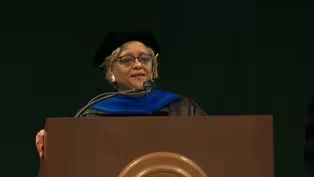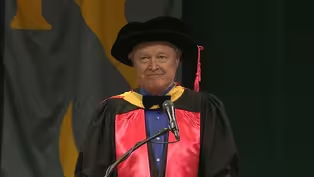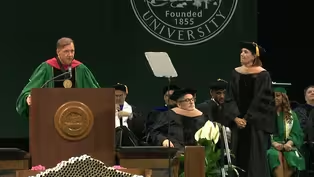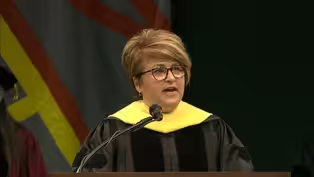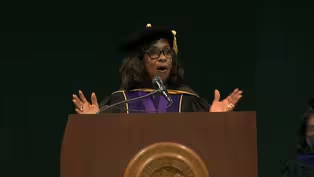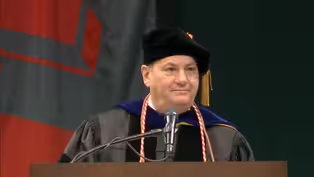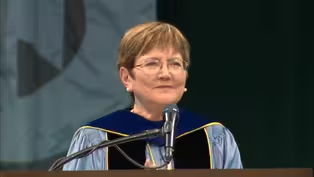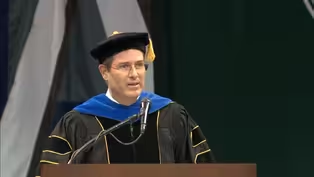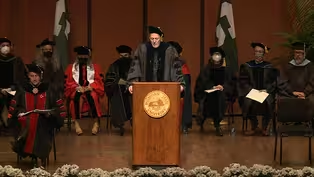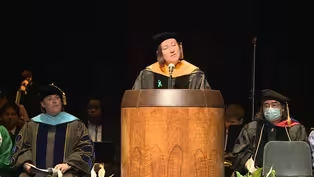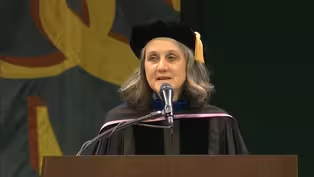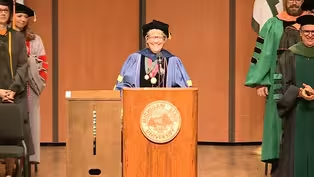MSU Commencements
James Madison College | Spring 2022
Season 2022 Episode 9 | 1h 35m 50sVideo has Closed Captions
James Madison College | Spring 2022
James Madison College - Spring 2022 Commencement Ceremony from Wharton Center on May 7, 2022
Problems playing video? | Closed Captioning Feedback
Problems playing video? | Closed Captioning Feedback
MSU Commencements is a local public television program presented by WKAR
For information on upcoming Michigan State University commencement ceremonies, visit:
commencement.msu.edu
MSU Commencements
James Madison College | Spring 2022
Season 2022 Episode 9 | 1h 35m 50sVideo has Closed Captions
James Madison College - Spring 2022 Commencement Ceremony from Wharton Center on May 7, 2022
Problems playing video? | Closed Captioning Feedback
How to Watch MSU Commencements
MSU Commencements is available to stream on pbs.org and the free PBS App, available on iPhone, Apple TV, Android TV, Android smartphones, Amazon Fire TV, Amazon Fire Tablet, Roku, Samsung Smart TV, and Vizio.
Providing Support for PBS.org
Learn Moreabout PBS online sponsorshipMore from This Collection
May 5-May 14, 2022
College of Human Medicine | Spring 2022
Video has Closed Captions
College of Human Medicine | Spring 2022 (2h 49m 1s)
College of Natural Science | Spring 2022
Video has Closed Captions
College of Natural Science | Spring 2022 (2h 39m 34s)
Undergraduate Convocation | Spring 2022
Video has Closed Captions
Undergraduate Convocation | Spring 2022 (1h 21m 59s)
College of Agriculture and Natural Resources | Spring 2022
Video has Closed Captions
College of Agriculture and Natural Resources | Spring 2022 (1h 40m 31s)
College of Engineering | Spring 2022
Video has Closed Captions
College of Engineering | Spring 2022 (2h 3m 1s)
College of Education | Spring 2022
Video has Closed Captions
College of Education | Spring 2022 (1h 42m 47s)
College of Arts and Letters | Spring 2022
Video has Closed Captions
College of Arts and Letters | Spring 2022 (1h 20m 30s)
Residential College in the Arts and Humanities | Spring 2022
Video has Closed Captions
Residential College in the Arts and Humanities | Spring 2022 (1h 26m 10s)
Lyman Briggs College | Spring 2022
Video has Closed Captions
Lyman Briggs College | Spring 2022 (1h 25m 22s)
College of Social Science | Spring 2022
Video has Closed Captions
College of Social Science | Spring 2022 (2h 48m 10s)
College of Nursing | Spring 2022
Video has Closed Captions
College of Nursing | Spring 2022 (1h 44m 11s)
Providing Support for PBS.org
Learn Moreabout PBS online sponsorship(upbeat jazz band music) (audience applauding) (upbeat jazz band music) (audience applauding) (cheering and applauding) ("Pomp and Circumstance") (audience applauding) (audience applauding and cheering) (audience applauding and cheering) (audience applauding and cheering) (audience applauding and cheering) (audience screaming and cheering) (audience applauding and cheering) (upbeat jazzy music) (audience screaming and cheering) (audience yelling and cheering) - All right, I declare the 52nd commencement of Michigan State University's James Madison College now open.
(audience applauding and cheering) We begin our ceremony with the MSU land acknowledgement.
We collectively acknowledge that Michigan State University occupies the ancestral traditional and contemporary lands of the Anishinaabeg/Three Fires Confederacy of Ojibwe, Odawa, and Potawatomi peoples.
In particular, the university resides on land ceded in the 1819 Treaty of Saginaw.
We recognize, support, and advocate for the sovereignty of Michigan's 12 federally recognized Indian nations, for historic indigenous communities in Michigan, for indigenous individuals and communities who live here now, and for those who are forcibly removed from their homelands.
By offering this land acknowledgement, we affirm indigenous sovereignty and will work to hold Michigan State University, more accountable to the needs of American Indian and indigenous peoples.
We ask our guests to please rise if able and join with the students and faculty in singing "America the Beautiful", accompanied by the MSU College of Music's jazz orchestra, directed by university distinguished professor, Rodney Whitaker, with vocalists, Sarah Whitaker.
("America the Beautiful") (audience applauding) Please be seated.
The occasion of this commencement finds us assembled in humble gratitude for a university community and a faculty and student body in whom we take justifiable pride.
The most deserving honored guest present here today are those of you whose constant support and love have sustained the graduates we gather to recognize.
I asked the class of 2022 to rise and turn toward their parents and loved ones to express the gratitude I know they feel.
(audience applauding and cheering) While you remain standing, graduates, I ask you now to turn towards those whose special work has been to guide you in your studies: Your faculty.
Will the faculty rise and be recognized by these graduates and their families and friends.
(audience applauding and cheering) I want to thank you for coming out on this day to celebrate the accomplishments of this great group of students.
I know firsthand the great strengths of our college, especially its faculty and staff.
But as I have learned in my short time at Madison, we are so fortunate to have the kind of students we have, and so fortunate to be in a position to teach them at a time when they're coming to exercise their full intellectual gifts and entering adulthood.
On behalf of the faculty and staff, I wanna express my gratitude to the parents, grandparents, guardians, and loved ones for trusting us to do this work.
We enjoy this afternoon in the presence of some special guests: US Representative for Michigan's Eight District, Congresswoman Alyssa Slotkin, will deliver our commencement address.
(audience applauding) Myra Beverly of the class of 2022 will present the student commencement address.
(audience applauding and cheering) Very, very popular.
(laughing) Other guests participating in the ceremony today are Professor Anna Pegler-Gordon.
(audience applauding and cheering) Okay.
Assistant Dean Brian Johnson.
(audience applauding and cheering) Associate Dean Linda Racioppi.
(audience applauding and cheering) And Mr. Maxwell AH-LUH-VEHR-OH.
(audience applauding and cheering) Also on the platform to honor this fine graduating class, Assistant Dean Jeff Judge.
(audience applauding and cheering) Okay, let me read these other names, and then applause at the end.
(laughing) Professor Matt Zierler, OH-LUH-FUM-BEE OH-LUM-BOH, Kirstin Brathwaite, Yale EHR-NOFF, Rashida Harrison, Dan Kramer, Amanda Flame, Louis JUH-ZIHN-SKEE, Amy Simon, and Norman Graham.
(audience applauding and cheering) - We would like to recognize and thank Andrea KLY-VEHR, who will be translating for the open captioning in our ceremony today.
And we would also like to recognize and thank the MSU College of Music jazz orchestra for their performances today under the direction of university distinguished professor, Rodney Whitaker.
(audience applauding) You can all be seated.
A member of Congress needs no long introduction, yet a life's devoted so successfully to public service at such a young age, such as that of the honorable Alyssa Slotkin deserves praise.
Moreover, her career represents the mission and highest ideals of public service fostered by the college.
The national security work that Congresswoman Slotkins has done is very complex and difficult, especially in times of war or grave international crisis.
Done right, this work is bipartisan or at least attracts a broad set of interested parties from both sides.
It functions in the competition and scrutiny of multiple agencies in Washington, as well as in multiple countries, languages and cultures.
There is no magic solution to any problem, but usually an overlapping set of actions that bring together allies and convince opponents to cooperate.
What so impresses me about Congresswoman Slotkin is her work in the difficult area of intelligence support.
Here, you have to deliver the facts as you know them, which invariably is a snapshot and never as complete as any policymaker wishes.
You have to serve equally to presidents, secretaries, undersecretaries, and members of oversight committees of different parties while not necessarily engaging in the policy debate.
You provide the underlying analysis, regardless of whether that creates awkward moments with policymakers.
Congresswoman's Slotkin is under best in that capacity.
She was recruited by the Central Intelligence Agency to be a middle east analyst and went on to devote her career to protecting the United States from national security threats.
In her role at the CIA, Representative Slotkin worked alongside the US military during three tours in Iraq as a militia expert.
In between her tours in Iraq, she held various defense and intelligent positions under President Bush and President Obama, including roles at the White House and the office of the Director of National Intelligence.
As a Congresswoman, Representative Slotkin can and does have views on policy, but I believe her work in helping to advocate for and oversee sound policy is shaped by the sense of how this vast national security apparatus works and how complicated it is.
I think she especially understands the sacrifices made by the military, diplomats, and others on the front line.
She also has an ability to explain these important issues to her constituency.
A constituency like any other in the United States is more often moved by economic questions and concerns about access to healthcare, clean drinking water, and new job opportunities.
Her diligent work in the area of national security policy has allowed her to have a sense of how important these other core issues claim most of our attention.
In a time of deep partisan divides, I can't help thinking we are well served by congresspeople such as Representative Slotkin, who have experienced working in the complicated world of national security, an area shaped by teamwork, self-sacrifice and a sense of national purpose.
It would not be a bad thing if some of the ethos of her work spilled over into our broader politics.
We're honored that Congresswoman Slotkin has agreed to address our graduates today, and I ask you all to welcome her to the podium.
(audience applauding and cheering) - Good afternoon, everybody.
Thank you, Dean, that was a very nice introduction.
Thank you to the James Madison faculty and staff, the board of trustees, friends and family who are here today, and of course, most importantly, the members of the 2022 graduating class.
Thank you for the honor of sharing this day with you.
It was my privilege to help celebrate this latest graduating class, because the institution has for more than half a century helped people of character establish careers of consequence in every imaginable field of public affairs.
As the professors behind me know, this is not my first opportunity to attend a James Madison commencement.
I was here in 2019 to give the graduation speech.
It was the before times, before COVID, before you sitting in front of us became a historic graduating class for surmounting nearly two years of your four virtual or hybrid or generally without what we call a typical college experience.
But even before that 2019 graduation, I'd actually attended as a guest, the 2018 graduation.
I was invited to share the day with one of my interns, someone who had came and worked on my campaign, she was graduating, and it was at that moment that I had a brief, deeply panicked couple of minutes.
I thought that day in 2018 would frankly end my very new campaign.
And it was the moment right after the ceremony, just as everyone had graduated, we were out going on the grass to celebrate and take pictures, and I saw out of the corner of my eye, my husband, retired Army Colonel Dave Moore, running through the crowd at top speed, shirtless.
And it's not that I don't appreciate my husband's shirtless, but as I stood taking selfies, I saw this bright white chest out of the corner of my eye, and I literally, my brain did not compute what was happening.
I could see the reports on the evening news, you know, candidate's spouse has a mental breakdown at the MSU graduation, complete with the shaky cell phone video, et cetera.
So it turned out that my retired army officer husband was doing exactly what you'd expect him to be doing.
He was taking care of someone else.
An elderly woman who had attended the ceremony had fallen down the steps.
She had cut her forehead, broken her nose, and she was bleeding profusely.
My husband stripped off his shirt to make it a bandage and then went running through the crowd to get some help for her.
So if you take nothing from today's ceremony but this, please remember, always be prepared.
From here on out, you will be asked to step up and meet the moment at the strangest of times.
And P.S., for the nervous parents in the room wondering what your child is gonna do after graduation, the staffer that I watch graduate in 2018 went on to enter the Navy.
She's now a cryptologic warfare officer in charge of 40 people protecting our country from cyber threats, and my special assistant who was in the crowd, Cassie Harris, graduated from James Madison two years ago.
So these young people graduating today are going to do great things.
Just give them a minute.
We have had a remarkable journey these last few years, and not just because of the massive changes we've gone through as we've tried to adjust to the global pandemic.
We are all different people after living through something like that.
In my family, we had already been in public service.
Again, me, as a CIA analyst, a national security professional, my husband in the Army, at the Pentagon.
My stepdaughters are also in service.
One's a brand new army officer, the other one's a physician for the VA.
But service to community and country has changed over these last few years, and you all sitting in front of us will be leading the way.
So when I was offered the chance to come back and speak at this gathering, I jumped at it, to have an opportunity to address people who are going to be affecting the public affairs of our community, our state, and our country.
I am so grateful you are making that choice and that the families here today supported you in becoming a person of purpose and mission.
So what I hope to do today is offer a few thoughts for someone who, a long time ago now, was in a similar position to where you're sitting.
I had made the decision to pursue public service.
For me, I can actually pinpoint the day.
It was September 11th, 2001.
I was in New York City.
I had just started Columbia University for graduate school.
I was on my second day when 9/11 happened.
And by the time the dust settled that day, I knew that I was gonna go into national security.
But if you're like me, you have some questions.
How best to navigate my path from here?
How do you turn the optimism and opportunity of this moment into a career and a life of purpose?
You have prepared, each of you, to take on the responsibilities of leadership.
Whether you pursue elected office or government service or the military or public policy or some other path, you are asking people to follow your lead.
And I've picked up a few lessons along the way that I thought might be useful.
The first, many of you have probably absorbed this simply by choosing to pursue an education in public affairs and public policy, but the lesson is be the player on the field and not the critic in the stands.
Whether you, whatever field you choose, whether it's politics or business or whatever, please don't be content with being a spectator.
Don't watch other people achieve great things.
Be the one that others watch.
You now have the benefit of an outstanding education.
Use it actively, purposely.
It has never been easier in all of human history to snark from the sidelines.
In an era of instant online commentary, literally everyone can be a critic, but your impact on the lives of your neighbors cannot be measured in retweets and shares.
That is not the way it works.
The question you should ask isn't what can I say about this?
It is, what can I do about this?
And don't think that simply joining the government or the C-suite or a big company is enough.
You will encounter an enormous number of people in your career at the highest levels who are perfectly content to remain on the sidelines.
They risk no exposure, no criticism, they don't wanna fail, and that is the easy path.
But you can't take the easy path and be a doer of great deeds.
So my second lesson has to do with the first: Stories matter.
You are graduating from an institution of higher education, where facts reign and logic, most of the time, conquers.
James Madison students in particular are taught to draw on data and research and factual presentations.
However, when you ask people to follow your lead, facts are necessary, but they are not sufficient.
People need context for those facts and to feel compelled to act when they hear about them.
And since cavemen literally made paintings on the walls, we human beings are wired for stories.
Game of Thrones, Shakespeare, whatever comic books you like to read, that is how we explain ourselves to one another.
And I had to learn this personal lesson the hard way.
When I was first running for Congress, my inclination was to talk about my resume, right?
Talk about CIA and the Pentagon and three tours in Iraq.
I hoped that that would be compelling to people.
But what spoke to people was the story of why I decided to run.
When I talked about the details of policy, people were politely interested, but when I described my mother and how she could not afford healthcare when she was diagnosed with stage four ovarian cancer, how without coverage, we spent the first days and weeks and months of her disease filling out the paperwork for her to declare bankruptcy, something changed.
People edged forward in their seats, and not because I'm a brilliant storyteller, but because policy is interesting, but people putting themselves in your shoes is always more compelling.
And sadly many people have been in that situation or a similar one.
Now there's no list of lessons that I could give you, or anyone could give you, that would be a future proof guide to all the twists and turns that your path is gonna take from here.
You will face difficult decisions, trade offs, and impossible dilemmas.
Stepping into the arena means opening yourself to criticism from the sidelines and no story you weave will insulate you from all criticism.
But responding to these twists and turns to the things out of your control is where your character shows, and it's impossible without a foundation of principles to rely on.
So that's my third lesson.
To update a quote from a classic TV show, "A man or a woman has got to have a code", and I'd encourage you to find your own code and follow it.
Military officers, government officials have no shortage of rules, oaths of office, official ethics requirements, laws, regulations, but I'm talking about something different.
I'm talking about the code by which you measure the performance of your life.
What are the principles and values that are most important to you?
And if, sitting here this afternoon, you can't yet cite your own code, now is the time to find it.
Cuz I assure you a career in public policy will test your moral compass.
This is the code that you'll rely on when you're criticized, when you're attacked, when people question what you're trying to do to move something forward.
For me, the code that I left graduate school with was speak truth to power.
Speak up even if it's intimidating.
It's actually something that I was taught as I became an analyst as a CIA as well.
Believe it or not, the CIA has rules in place to ensure that even the most junior operators and analysts can speak their mind.
As an analyst, you are piecing together stories and trends, and then you're, you know, from top secret sources and you are literally writing short and medium length articles that are put together in a book and given to the president of the United States and the cabinet.
That is high stakes work.
But as your article goes up the chain and gets edited, it changes.
And even as a baby analyst, you still have the last word.
When it's finally being finalized, they're ready to publish, you get called down in your office to come up to the top floor, and you as the junior analyst, get to sign off on that article before it goes to the president.
And if it has changed too much from your original, you can veto it.
Can you imagine me as a 26 year old waiting until midnight, getting that call going up there and then being the last person who sees that article before it goes to the President of the United States.
I always had the ability to speak truth to power, to change what was gonna go on in those wee hours of the morning.
Likewise for CIA operators, or spies as Hollywood likes to call them, they also have an outlet to speak truth to power.
Our operators are the ones that spend most of their careers abroad.
They report from dusty off the grid locations like Afghanistan and also fancy cocktail parties in European capitals.
They send reports back to Washington about foreign governments and groups and decisions that they're making.
But if you think that Washington is off track, our spies can send back a special report.
It's called an Aardwolf.
I have no idea why, I tried to Google it last night.
And an Aardwolf is basically a dissent channel for them to say to Washington, I don't believe you're understanding the full story.
And when it happens, it's a really big deal.
In 2004, I was on my first tour in Iraq, first tour of three alongside the military.
The war at that point was something that the majority of Americans still supported.
We had supported it in the wake of being attacked on our own soil on 9/11, but a full-blown insurgency was starting and American soldiers were being attacked and targeted.
Shia and Sunni Iraqis were killing each other in the streets, and yet back in DC, it was being spun as a successful war.
The man who was the CIA station chief, so the senior-most CIA officer in Iraq, knew then that what was coming out of DC was wrong.
So he drafted an Aardwolf, sending it back to the director of the CIA, telling him that our efforts in Iraq were in serious trouble and that our strategy would not work.
It was a very gutsy thing to do.
And while that man was a complicated guy, he had a code and that made all the difference.
That code of speaking truth to power tested me later as a young CIA analyst.
I was working on Iraq at Langley, at headquarters, and President Bush was the president, and the word came down that after many years of kind of believing the war was on track, he hadn't realized that he was being insulated from the truth on what was going on.
So he decided rather bravely that he would ask young CIA analysts to come to the Oval Office every morning to brief him without their bosses.
That is not normal.
That is not normal.
So the word comes down to Langley, they get us all in a room and they say, so now when you write an article for the president, you're gonna go on Monday and brief it.
Who wants to volunteer?
Oh yeah, that was why I was doing that job.
That was what I was meant to be doing.
I signed up and I went the first week.
So I create my article, I get my brief down and I go down that Monday to the Oval Office.
Now you've seen pictures of the Oval Office, the famous desk, the John F. Kennedy desk.
There's George Bush, Vice President Cheney, the national security advisor, all on these kind of nice, polite couches, and we're having a discussion about a militia that I know very well.
I have spent years studying these folks, talking to folks from that militia.
And we had what I can only describe as a healthy disagreement about what to do about that militia.
We went back and forth.
It was clear that the president and the vice president did not agree with me, and it was hard, I will tell you, to maintain that code of speaking truth to power.
When you're in the Oval Office, it's much easier to just cave to what everyone else is thinking.
We had a debate, it never got vitriolic.
It never got bitter.
It was decent.
We finished the brief not agreeing, but at least having that healthy debate.
We walked out of the Oval Office and the national security advisor said, if you can argue with the president of the United States and not piss him off, you should come work here.
And a week later I started working on the National Security Council for George Bush.
You gotta have a code.
And finally, my last lesson: Never let the perfect be the enemy of the good.
I wanna highlight the fact that you were trained at one of our great Midwestern universities and that a Midwestern pragmatism will always serve you well.
The majority of you were taught by your families to put your head down, focus on the goal, and get things done, and that grandstanding is neither desired nor needed.
You were taught that helping other people is the ultimate mission, and succeeding in that mission is reward in and of itself.
Good Midwestern pragmatism will do more to truly help people than idealism backed up with little more than words.
You have got to work.
You may not know it yet, but you soon will, that ethos of hard work and pragmatism is extremely rare.
Hold onto it.
Lead by example.
Progress over perfection is how we move the issues that we care about.
Now, I can't guarantee that if you follow these four lessons, challenges will melt away.
You learn as you go, you get better along the way, and you try to pass on what you've learned.
And hopefully these lessons will occasionally make the challenges a little less daunting, a little clearer, the solutions a little clearer.
As students in public policy, you know that today's world is full of challenges and problems, and we're always short on doers of deeds.
I'm so grateful that each of you has decided to study at a place and focus on the civic experience.
Service to your community and your country is the greatest love letter that you can send to this place that we all love.
It is an opportunity to put your blood and your sweat and your tears into making this country that is given us so much even better.
We are not a perfect place, but we have created opportunities for you all to move us forward.
I am so proud of the hard work that you have done, I am so proud of the parents who got you to this point, and I am so looking forward to the amazing kickass things you're gonna do.
Thanks very much.
(audience applauding and cheering) (upbeat jazz music) (audience applauding and cheering) (upbeat jazz music) (audience applauding) (upbeat jazz music) (audience applauding) (gentle jazz music) (audience applauding) (upbeat jazz music) (audience applauding) (upbeat jazz music) (audience applauding) (upbeat jazz music) (audience applauding) (upbeat jazz music) (audience applauding and cheering) - Good afternoon, everyone.
Good afternoon, JMC graduates.
JMC grads, I wanna thank you for so graciously welcoming me into the JMC community.
Just as a teacher always remembers their first group of students, I will remember you as the first students I worked with at JMC.
Early this semester, I began my time at Madison by meeting with and listening to students.
I learned about their interests, their concerns, their goals, their concerns, JMC history and culture, and in case I forgot to mention, their concerns, which is good.
It's what we want.
I first met Myra during one of my meetings with Professor Flames' senior seminar class.
While I so appreciated the updates and concerns from each of the students, Myra began her introduction with eight words that particularly resonated with me and I will never forget.
She said, "It's so good to see your smiling face."
To paraphrase Maya Angelou, people will forget what you said, they will forget what you did, but they will never forget how you made them feel.
Myra's words made me feel welcome, valued, and a part of JMC.
Her words were authentic, sincere, and profound.
Little did I know at that time that she was a prolific poet.
All I knew was that her words left me encouraged and happy to be a part of JMC.
And that began the first of many lessons and support that I would receive from Myra.
I would soon learn of her deep commitment and efforts to advance social justice, her academic and empathic brilliance, and her overall commitment to making JMC a more inclusive place.
She is humble, yet exceptionally wise.
She's a thinker, a listener and a change agent, and I have been impacted for the better due to her support, encouragement and actionable examples of how a person can make transformative change through their actions and efforts.
Myra, JMC is a better place because of you and I am a better administrator and person for having worked with and learned from you.
Just as Myra has been a source to support from me, she's been that for her JMC friends as well.
Her JMC friends describe her as fearless, living powerfully through her values, standing up for people, no matter the circumstances, and caring for others unwaveringly, Myra is graduating with a bachelor of arts in comparative culture and politics with minors in Korean and Spanish.
She's a part of the MSU Honors College and has consistently remained on the Dean's list.
She has studied abroad and believes in Belize and the UAE and will serve as a research assistant in Cambodia this summer.
During her time at JMC, she has served as a resident assistant, a research assistant, outreach officer, JMC peer mentor, and intercultural aid for Mosaic.
She is committed to mentoring other students and making them feel welcome during her time here at MSU.
In addition, Myra has received numerous awards and honors, including outstanding senior in comparative cultures and politics, honorable mention in Warren Newport Public Library's Creative Writing Contest for Peace, second place in the annual Speech Korean Contest, recipient of the Joan Moon Scholarship, recipient of the Korean Language Program Scholarship, and recipient of the Sylvia Tran Scholarship.
Through her poetry and spoken word, Myra emphasizes the importance of sense of belonging, advocacy and equity.
Her poetry and insights into her experiences as a multiracial and multiethnic student were recently featured on the Tamron Hall Show.
In addition, in the very new near future, Myra will publish her own book of poetry.
For those of you who are preparing for the LSAT, I'll phrase this as a logic game.
Myra's voice is as important to James Madison and society in general as MSU green is to MSU white.
In her words, reflection and insight are just what we need as we all conclude what has been a challenging and tumultuous year, or past few years.
To quote one of Myra's writings, "My people persist at the back of my throat and say, Speak."
Myra, your classmates have spoken, and it is your time to speak.
Everyone, I challenge you to hear Myra speak and not be deeply moved, encouraged, and motivated to make a difference.
As many of you know, poet's feet on the warmth of their audience, and Myra, we eagerly and excitedly await the message that you will now bring.
So at this time, please give the warmest JMC welcome you possibly can to this year's student commencement speaker, poet, activist, scholar, and all around brilliant human being, Myra Beverly.
(audience applauding and cheering) - Thank you.
I did not know Dr. Johnson's gonna say all that.
So thank you for such kind words and introduction.
I'm very grateful and honored to be this year's commencement speaker, and I'm glad to welcome everyone and thank everyone for being here to celebrate our achievements and our sacrifices.
As I was mentioned, again, I am Myra Rafia Beverly and I am a poet.
So if you don't know how poets usually are like, if I say something, you're like, oh, okay, you can snap.
Or you can be like, okay, I see you, or you can rub your heart, whatever you feel like.
If you don't like it, just pretend and just be like, oh, I'll talk to her later, like, I'll tell her earlier.
(audience laughing) Firstly, I would like to echo Dean THEE-SUH's earlier land acknowledgement with part of the extended version as provided by the MSU American Indian and Indigenous Studies Department.
We as James Madison college collectively understand that offering land acknowledgements or land recognitions does not absolve settler-colonial privilege or dissolve colonial structures of violence at either the individual or institutional level.
We recognize that land acknowledgements must be preceded and followed with ongoing and unwavering commitments to American Indian and indigenous communities.
We push Michigan State University to recruit, retain, and support American Indian and indigenous students, faculty and staff.
So I would like to thank the land that we are currently on and the indigenous communities that are not only a critical part of that MSU's history, but also our present and our future.
When thinking about my history, yep, you're getting it, you're getting it, I would like to remember how I came to Michigan State as my dream school with a flame in my heart, burning to learn the ancient arts of politics, writing, and the art of saying a lot of words without really saying anything at all.
(audience laughing) My first semester was 19 credits because I didn't know what a credit was.
I thought more credits, the better.
(audience laughing) I got my first grade back on a test in MC 201, on a test I did not study for cuz I did not think I needed to.
To be a 2.5, which for everyone who doesn't know, it's like a C or a D, I don't know what that means.
But to me, I was like, it's not perfect.
And I was thinking, am I dumb?
Did no one tell me in high school that I was actually dumb and let me go here.
And after a tough semester, I still finished on the Dean's list, but I felt the fire in my heart flicker in self-doubt.
Since then I've watched my body grow and my mind mature.
I've watched my parents' wrinkles set in.
I watch them walk a little slower and my dad sometimes accidentally calls me his sister's name.
In other words, for the past three, four or five years at Michigan State, all of us have aged with the weight of more responsibilities, obstacles, discoveries, and friendships.
We have felt a certain pressure on our shoulders when COVID-19 reached the United States two years ago.
And yes, it's been two years.
Our classes were completely online and some classmates I am seeing today for the first time in those two years.
Most of us, including myself and my family, lost our jobs or lost our loved ones.
We spoke of war without seeing the war, frontline workers like cashiers, restaurant staff, or city bus drivers were soldiers in the war against the enemy virus.
We saluted the bravery of healthcare workers and a face mask became a shield.
The COVID-19 global pandemic intertwined with our country's underlying issues to inspire nationwide protests against racial and class injustice.
In fact, some of my fellow graduates and I were those frontline workers as we tried to make up for unpaid internships with companies that could definitely afford to pay their interns.
We were still active at local protests and marches, all the while we were still working towards the degree we earned today.
So I'm here to address the question every student is thinking or has thought at one point after being left in the wake and crossfire of our world crises and realizing that none of us are invincible.
We ask ourselves, what now?
What do we do with all of our books, all of our curiosity, all of our knowledge and all of our memories, and how do we live with all of our rage, all of our fear, all of our injustices and all of our sorrow?
What do I do with a degree that I dedicated years of my youth to earn?
In freshman year, our professors warned us that you will leave with more questions and answers.
And for you all today, I present to you one of the many answers that I have come up with in the last four years at Michigan State.
I believe, as writer and civil rights activist, Audrey Lorde, said, "Caring for myself "is not self-indulgence.
"It is self-preservation.
"And that is an act of political warfare."
Meaning self-care is a form of activism and rebellion that we can do to create new ways of approaching crisis and injustice, as a way to counteract the strikes of internalized doubt, hate and restrictions.
In James Madison College, it seems like the weight of newly absorbed theories, case studies and definitions, you reveal more and more nuances of your hometown, your family, and yourself.
You're often left every class with a hole in your heart of, well, that sucks, and in that hole where hope should be, you start to accept that that's just the way things are.
But I have realized that our pain just like your love and your hope is renewable energy, is like the sun to revive you, to power your body and mind and make you say instead, this is the way things are, but this was never the way things were supposed to be.
So despite what hustle culture, FOMO, or what your parents may say, it's okay to take a break, preserve your energy and not know what your next move is.
Sometimes resilience looks like going back to your parents' house and taking multiple gap years and finally reaching out for mental health support.
Graduating class of 2022, as Madisonians, we don't like to sit still.
We are bound to the call for justice.
We make friends with our resistance and learn new ways to approach it.
We are unafraid to engage in uncomfortable situations.
If anything, people are afraid to talk to us, and that's something we gotta work on.
(audience laughing) But all of us were once children feeding on a dream and we owe our success to the teachings of our ancestors, our professors, and our mentors.
But I urge you all to be a little selfish today.
You did this, you did all the work and you are so bright.
So please, class of 2022, if no one has said it yet today, I am so proud of you, I am always rooting for you, and congratulations.
Thank you.
(audience applauding and cheering) - Class of 2022, congratulations to you and your families.
It is so great to be with you in person and online.
(laughing) Here we are at this pivot point in your lives.
This gathering, this ceremony, this moment in the ceremony when you will walk across the stage Is a hinge on which your lives turn.
We have spent a good amount of time today looking forward.
You have heard a lot of good advice, and we hope that you carried that advice with you.
We, the faculty have high hopes for you.
We look forward to following you as you leave James Madison College and Michigan State University and go out into the broader world.
We have also spent a good amount of time looking back.
As you know, I am a historian of public policy, so I love looking back and thinking about how the past has shaped the present.
I'd like to take a moment to revisit some of our guiding questions from your first class at James Madison College, (audience laughing) Introduction to Public Affairs, or MC 201.
(audience applauding and Madisonian) And I'd like you to think about how these questions and your answers to these questions have shaped you over these last four years.
What are the tensions between individual Liberty and the common good?
What happens when different groups claim conflicting rights or freedoms sometimes in the most foundational spaces, the land on which we live, or the bodies which we inhabit?
In what ways do formal universal ideas of equal citizenship overlook questions of social class, race and gender.
Does globalization challenge national citizenship.
Does it support a more transnational cosmopolitan citizenship or does it intensify national affiliations.
Is the entire concept of citizenship at odds with the belief that all human beings have fundamental human rights?
Throughout your time at James Madison College, we have asked you these kinds of vital questions.
The questions may differ from major to major, but they share the same essential goals.
We ask you to think deeply about the world and your place in it, and we ask you to think about how to make the world in which you live more like the world in which you want to live, and not only to think, but also to act.
We have asked a lot from you.
I hope you to continue to think about these big questions, to revisit them, and to think about how your answers change over time.
But before I go, I'd like to ask you a few more questions from MC 201.
How does a rag tag group of students in need of a shower somehow learn of global superpowers?
How do you emerge victorious from this quagmire, and let's face it, during these last four years, at many times it has been a quagmire.
Leave the college, waving your flag of learning higher.
How did you not become undone in 201, reading TOH-POH and The Federalists when you had just begun.
You got a lot farther by working a lot harder, by being a bit smarter, by being a self-starter.
And turns out we have a secret weapon, a faculty you know and love who's not afraid to step in.
We're constantly confusing, confounding you with our questions.
Everyone give it up for your favor professors.
(audience applauding and cheering) Candidates of James Madison, diplomas are waiting right up here for you.
If you join us right now together, you'll be alumni.
Aye, oh, candidates of James Madison, you have family that will cheer for you.
If we manage to get this right, you'll be graduates by early light.
(audience laughing) Now will the candidates please rise.
(audience applauding and cheering) Dean Hughes, on behalf of the faculty, I present to you, the candidates for the degree of bachelor of arts from James Madison College and Michigan State University.
(audience applauding and cheering) - How am I supposed to follow that?
Come on.
Oh, I know, how about, on behalf of the president to whom the board of trustees has delegated the authority of the state of Michigan vested in the board.
I confer upon all of you the degrees for which you have been recommended with all the rights and distinctions to which they entitle you.
Professor Linda Racioppi and Maxwell AH-LUH-VEHR-OH will announce the names of the graduates as they receive their diplomas.
We ask the audience to be considerate and hold your applause while graduate names are read.
The candidates may come forward to receive their degrees.
(speaking faintly off mic) - Oh, they hand you the card, huh?
- Yeah.
Usually this is on the other side.
I think we should move this.
- Why?
- Because we're gonna be getting cards from this way, and then we want to put them here.
- One second, we're reorganizing.
(speaking faintly off mic) - Myra Rafia Beverly.
(audience applauding and Madisonian) - Emma LOH-REH-KAH.
- Allen Henderson.
(audience applauding and Madisonian) - Reese McCaskill Jr. - Anthony WAH-GOH.
- Caitlyn Novak.
- Caroline Freshwater.
- Hope Odell.
- Keegan Sullivan.
- Vincent SIH-GUM-TEEN.
- Yates McLaughlin.
- Grace Brandon.
- Caitlin Ashman.
- McKenna Welsh.
- Alec WAH-TOFF.
- NIH-KEEL BUHN-DEHR-KAHR.
- MIH-KY-LUH Lewis.
- Kristen SWUHN-TIHK.
- Leah BAHL-MAHR-EE-TOH.
- Olivia GUH-NAH-SKEE.
- Anna Kushner.
- Brooklyn PEH-POH.
- LOO-SEHN-EE-YAH Johnson.
- Leniseya.
- Leniseya Johnson.
- Katrina OH-LEHRT.
- Justin Warner.
- Kristia POHST-MAH.
- Hannah ME-SKAR.
- Anthony EHTCH-EH-LOO-NIHS.
- Benjamin SUH-GRIHT-UH-LOH.
- Abigail Schafer.
- Audrey DAH-MAN.
- Carolyn Michelle Gate.
- Solomon Kronberg.
- Elena Murphy.
- SHAH-MOHN Lickman.
- Melissa Krieger.
- Avi Cohen.
- Kevin Mulligan.
- Caroline Weaver.
- Samantha KIHSH.
- Cheng GAHN.
- Lauren Johnson.
- Paige Barnes.
- Alexander Blanchett.
- Leila Belissimo.
- Ellen Burke.
- Dakota DEETS.
- Ethan KLOHR.
- Emma Grace.
- Alex Acker.
- Siri AAN-IHTH.
- Aldo BOOT-IH-ZOH-NEE.
- Hope Banks.
- Angie Flores.
- Jennifer NAHR-DIH-NEE.
- Troy DIHS-TOH-RAF.
- Jacqueline Gina.
- Amira Hunter.
- Nia Todd.
- Beebee Lipton.
- Sydney Naro.
- Martina Jimenez.
- Leo Saint UH-LOHR.
- Benjamin Worley.
- Zachary Penrice.
- Raphael Paz.
- Jonathan KUH-TOHR-EE-AH-NOH SOO-AHN.
- Chloe MY-ZEHL.
- David Tran.
- Liz UH-KAHD.
- Justin Fernando.
- Danielle Brennan.
- Taylor Bellia.
- Lucy Gill.
- Molly Lumkey.
- Gabrielle DRUH-KAH-SEE.
- Jarron Tyler.
- LAYTH Mayer.
- Benedict NOH-SEHN-GUH.
- Ethan AHND-BEH-GAND.
- Ashley KUHT-NIHK.
- Sammy SHUHK.
- Erica Danzig.
- Rembrandt Mumby.
- Dylan McGinnis.
- Killian GAHN-SHEH.
- Noah Kenda.
- Eleanor MAK-WEE.
- Joel KOH-MUH-ZIHN-SKEE.
- Amanda BIHG-NAHL.
- Adam Shera.
- Emma Young.
- HIH-BUH HOH-IG.
- Crystal Bernard.
- Rachel Winfield.
- Jake Cohen.
- Sophia KOHL-VIHN.
- Natalia Bordeaux.
- Joseph Augusta.
- Carson AH-BOOT-NAHK.
- Sasha Schuster Brown.
- Bianca Castillo.
- Kirsten Burkey.
- Sophia Gilchrist.
- Lauren Purchase.
- Olivia McKayla.
- Julia GEHS-EHR.
- Alexander Kronan.
- Sydney NEH-MIHTZ.
- Samantha Ann Merrick.
- Katherine Walter.
- Christopher Ike.
- Gavin Webb.
- Brianna SOHR-OH-LEE.
- Charles Jones.
- Maxim Jenkins.
- Jacob Roman.
- Kevin CRAYSS.
- DDaniel Murray.
- Emily Hansen.
- Tova Carter.
- Audie GOO-YAH-MOH.
- Holly Nusbaum.
- Kathleen France.
- Matthew Apostle.
- Deandrea White.
- Nina Robinson.
- Christian Fend.
- Christian SIH-RAH-FUH.
- Jamie Cowman.
- Brittany Biggerstaff.
- Natalie Rios.
- Margaret Keller Bennett.
- Andrew Zuka.
- Anastasia BRAH-SKOH-VITCH.
- Jayden Kazinski.
- Darion BAD-OH-GIHN.
- Bridget Bower.
- Wyat Humphrey Phillips.
- Nathan Feedner.
- Jack FAH-LEHN-SKEE.
- David BIHR-THEHN.
- Luke Brinks.
- Alexis Lehman.
- Olivia WEHL-EH-VEH-RUH.
- Samantha Williams.
- Elizabeth LEE-KOH.
- Maria Elizabeth Gordo.
- Angelina Sandora.
- Madison Lee Coil.
- Dora Patel.
- Nadia Clemens.
- Douglas Temple.
- Andrew Judge.
- Linda Wu.
- Milo FY-FEHLD.
- Julia Ray MIHK-KAYK.
- Rena Young.
- Rosa RAHZ-NEE.
- Caroline Sherman.
- Emma Walters.
- Ben DEH-LEEN-GUH.
- Alexa PEER-ZEHN-SKEE.
- Sophie Christensen.
- John Paul Murray.
- Jack Wheatley.
- Jacob Hall.
- Thomas Done.
- Luke SPITZ-LEE.
- Chloe Barbossa.
- Andrew Churchill HAY-STEE-MY-NEHR.
- Ireland Wayland.
- Brian Kwon.
- Marcus Cartright Hoff.
(speaking faintly) - Areba NAH-DEEN.
- Emerson Higgin.
- Michael KAHR-LAH-NUH.
- Patrick Mehan.
- Ava Milana.
- Alexis Courtney.
- Casey Collins.
- Brianna Jones.
- Brianna Hankins.
- Nathan ROHN.
- Logan Strickler.
- Adam Hunt.
- Jack Gasper.
- Ethan LAH-ZAH-RUH.
It's Italian.
- Parker McBain Selders.
- Maya KAHR-BEHN-KAM-BAH-LUH.
- Rebecca McBride.
- Kayla Johnson.
- Emma Gilbert.
- Lauren Kruger.
- Josh Carter.
- Miles Morgan.
- You can be seated.
So now is the part of the ceremony where I formally offer the graduating class some words of wisdom and instructions as you conclude your time as an undergraduate student.
I know I have not been a Spartan and a Madisonian for long as I joined the college nearly a year ago, not quite a year, and regrettably, the pandemic has had an impact on the opportunities to fully interact with the whole Madison community.
But thankfully we are here together, sharing this space in person without masks, mostly, rather than staring at our computer screens.
Most of you arrived on campus during late August of 2018.
Once you established a routine for yourselves, I imagine you began to feel at home rather quickly, finding a favorite place to study, joining club war two or three or four, there quite a lot, actually.
How long before you heard yourself throwing around those now familiar acronyms, IR, SRP, CCP and PTCD, like you've understood this Madisonian alphabet your whole lives?
I think it's safe to say all of you settled into a life here that became what it was intended to be, a time to step outside your comfort zones, to learn about experiences other than your own, and to find your own people.
Hopefully that first year and a half gave you time to find some people to be your people.
You turned to them when you were scared, vented to them when you were frustrated, shouted with excitement when you were proud, and sat in silence comfortably when you simply needed companionship.
Because if there's anything the pandemic made abundantly clear, we need each other.
We need to have each other's backs when we are ready to throw our computers out the window, exhausted by seemingly endless Zoom sessions.
We need each other when nothing goes as planned.
We need each other when we are sitting with sadness and disappointment.
Because of COVID, everybody missed out on something planned and some have suffered greatly, financial security shattered, health severely compromises, lives lost without closure, and memorializing that we once knew.
At the height of pandemic fears, we saw many communities endure so much pain due to systemic racism, endemic violence, and social injustice.
Many here today identified personally with some of the stories that became part of the national conversation Grappling with what was unfolding on our screens or in our streets, aome of you may have had a moment of reckoning where you found yourselves inspired to take action in ways you hadn't before, or perhaps you were better able to articulate ideas you had tossed around in your head.
Living through these last few years has taught us all some lessons we need to revisit regularly.
Slow down.
Anything and everything can change without much if any notice, and what we think is most important usually is not.
We are all coming out the other side stronger and more resilient than before.
We've learned how to adapt when the unexpected occurs.
We've expanded our repertoire for problem solving.
We've had to think critically about issues we would not have been presented with had there not been a pandemic.
While many of you're natural born leaders, some of you found your voices because of the ways you've been tested.
As you know, Madison students have the well deserved reputation of stepping forward as campus leaders, case in point, our university legislative student government, ASMSU, holds annual elections, and each year, the representation from our college is astounding.
Year after year, most positions, including the office of president are held by JMC students, which is a Testament to our community.
We are a community invested in making a difference.
Your decision to pursue an education in public affairs reveals your commitment to learning about systems of governance and how these systems impact society .
Through your studies and your experiences these last few years, you have built a foundation that can be the springboard for any number of passions and pursuits.
Whichever path you take, there's no shortage of work to be done.
Use the knowledge you've gained and the skills you have owned for good.
Remember to act with integrity and always practice empathy.
According to custom, you may now move your tassels from the right side of your caps to the left.
(audience applauding and cheerings) This act represents the conclusion of a great achievement and marks the beginning of a lifetime of dedicated service.
Congratulations, MSU alumni.
(audience applauding and cheering) Please rise, if able, and sing the alma mater with the help of MSU College of Music's jazz orchestra.
("Shadows") (audience applauding and cheering) The audience may now be seated.
You're all welcome to attend James Madison College's reception in Club Spartan at Case Hall immediately following the ceremony.
To avoid congestion in the main lobby, families and graduates should try to meet up outside.
The faculty will now rise and recess through the great hall on the inside of the pillars, followed by the graduates.
Audience, please remain seated through the entire recessional until the very last graduate has exited through the back.
Thank you very much.
(audience applauding and cheering) (upbeat orchestral music) (singing faintly) (audience applauding and cheering)

- News and Public Affairs

Top journalists deliver compelling original analysis of the hour's headlines.

- News and Public Affairs

FRONTLINE is investigative journalism that questions, explains and changes our world.












Support for PBS provided by:
MSU Commencements is a local public television program presented by WKAR
For information on upcoming Michigan State University commencement ceremonies, visit:
commencement.msu.edu
